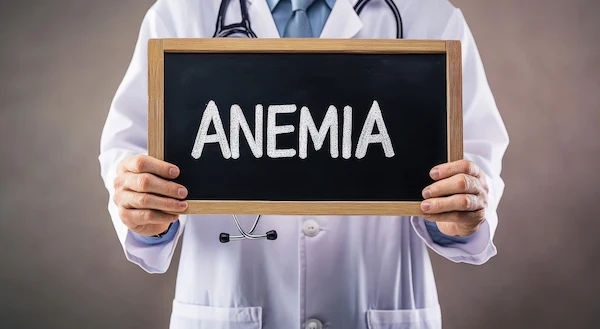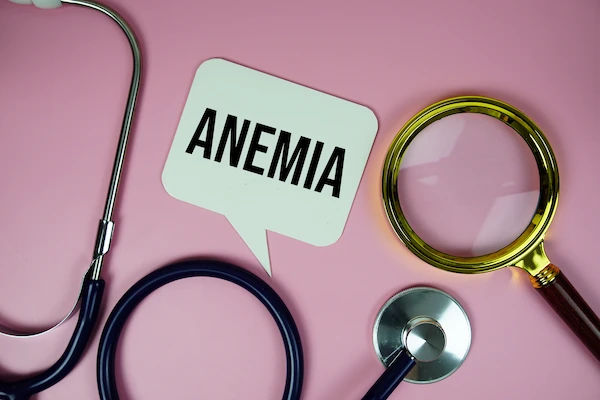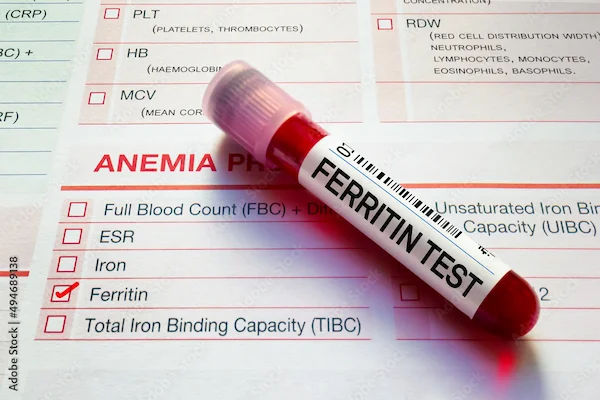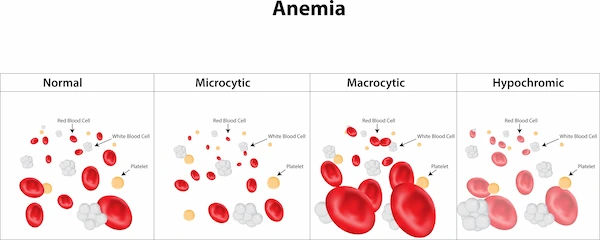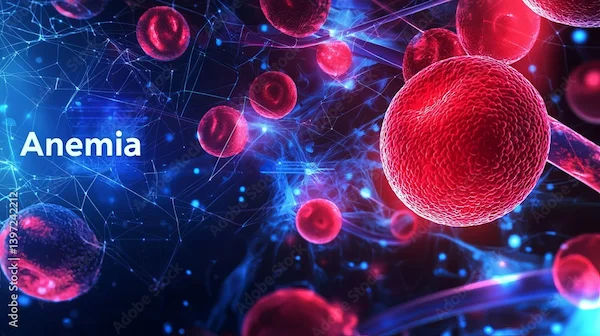Anaemia: Types, Causes, Diagnosis, and Management
Know all about the Anaemia case study, what it is, common types symptoms, and how it affects your health. Learn about the lifestyle and dietary tips for better health.

Written by Dr. Siri Nallapu
Reviewed by Dr. Shaik Abdul Kalam MD (Physician)
Last updated on 28th Aug, 2025
%20(1).webp?tr=q-80,f-webp,w-350,dpr-2,c-at_max 700w)
Introduction
Anaemia is a common health condition that affects millions of people worldwide. It occurs when your body doesn’t have enough healthy red blood cells or hemoglobin to carry sufficient oxygen to your tissues. This can leave you feeling tired, weak, and short of breath.
In this article, we’ll explore anaemia in simple terms—what causes it, how it affects your health, and what you can do to manage it effectively.
What is Anaemia?
Anaemia is not a disease itself but a sign of an underlying health issue. When you have anaemia, your blood lacks enough red blood cells (RBCs) or haemoglobin (a protein in RBCs that carries oxygen). This means your organs and tissues don’t get enough oxygen, leading to fatigue and other symptoms.
Common Types of Anaemia
1. Iron-deficiency anaemia: The most common type, caused by low iron levels.
2. Vitamin-deficiency anaemia: Due to lack of vitamin B12 or folate.
3. Hemolytic anaemia: When red blood cells are destroyed faster than they are made.
4. Aplastic anaemia: A rare condition where the body stops producing enough RBCs.
5. Sickle cell anaemia: A genetic disorder causing abnormal, crescent-shaped RBCs.
Consult the Best General Practitioner for Personalised Advice
Symptoms of Anaemia
The signs of anaemia can vary depending on its severity, but common symptoms include:
- Fatigue and weakness
- Pale or yellowish skin
- Shortness of breath
- Dizziness or lightheadedness
- Cold hands and feet
- Headaches
- Irregular heartbeat (in severe cases)
If you experience these symptoms frequently, it’s important to consult a doctor for proper diagnosis.
What Causes Anaemia?
Anaemia can develop due to several reasons:
1. Poor Diet (Nutritional Deficiencies)
- Iron deficiency: Not eating enough iron-rich foods (like leafy greens, meat, beans).
- Vitamin B12 or folate deficiency: Common in vegetarians/vegans or those with poor absorption.
2. Blood Loss
- Heavy menstrual periods
- Chronic bleeding (e.g., ulcers, haemorrhoids)
- Surgery or injury
3. Chronic Diseases
- Kidney disease
- Cancer
- Autoimmune disorders (like rheumatoid arthritis)
4. Genetic Factors
- Conditions like sickle cell anaemia or thalassemia.
5. Pregnancy
- Increased blood volume and iron needs can lead to anaemia.
How Does Anaemia Affect Your Health?
If left untreated, anaemia can lead to:
- Severe fatigue: Making daily tasks difficult.
- Heart problems: The heart works harder to compensate for low oxygen, leading to irregular heartbeat or heart failure.
- complications: Increased risk of preterm birth or low birth weight.
- Weakened immunity: Making you more prone to infections.
Early detection and treatment can prevent these complications.
Managing Anaemia: Lifestyle & Dietary Tips
1. Eat Iron-Rich Foods
- Heme iron (better absorbed): Red meat, poultry, fish.
- Non-heme iron: Spinach, lentils, beans, fortified cereals.
- Tip: Pair iron-rich foods with vitamin C (oranges, tomatoes) to enhance absorption.
2. Increase Vitamin B12 & Folate Intake
- B12 sources: Eggs, dairy, fortified cereals.
- Folate sources: Leafy greens, citrus fruits, nuts.
3. Avoid Iron Blockers
- Tea, coffee, and calcium-rich foods can reduce iron absorption. Avoid them with meals.
4. Consider Supplements (If Recommended by a Doctor)
- Iron, B12, or folate supplements may be prescribed if dietary changes aren’t enough.
5. Manage Underlying Conditions
- If anaemia is due to chronic illness, follow your doctor’s treatment plan.
6. Exercise Moderately
- Light exercise (like walking) can improve circulation but avoid overexertion.
When to See a Doctor?
If you experience persistent fatigue, dizziness, or other anaemia symptoms, consult a doctor. A simple blood test like CBC – Complete Blood Count can diagnose anaemia and its cause.
Early diagnosis and treatment can help you regain energy and prevent complications.
Final Thoughts
Anaemia is a manageable condition with the right diet, supplements if needed, and medical care. If you suspect you have anaemia, don’t ignore the symptoms seek medical advice. Small changes in your diet and lifestyle can make a big difference in your energy levels and overall health.
Consult the Best General Practitioner for Personalised Advice
Consult the Best General Practitioner for Personalised Advice

Dr Syed Mateen Pasha
General Physician
2 Years • MBBS
Bengaluru
PRESTIGE SHANTHINIKETAN - SOCIETY CLINIC, Bengaluru

Dr. Anand Ravi
General Physician
2 Years • MBBS
Bengaluru
PRESTIGE SHANTHINIKETAN - SOCIETY CLINIC, Bengaluru

Dr. Syed Ismail Ali
General Practitioner
7 Years • MBBS
Hyderabad
Apollo 24|7 Clinic, Hyderabad
Dr. Karanam Kondalamma
General Practitioner
4 Years • MBBS
Hyderabad
KK Clinic, Hyderabad

Dr. Madhuri Sai Sreepada
General Practitioner
9 Years • MBBS
Hyderabad
BRIGHT SMILES MEDICARE & DENTAL CARE, Hyderabad
Consult the Best General Practitioner for Personalised Advice

Dr Syed Mateen Pasha
General Physician
2 Years • MBBS
Bengaluru
PRESTIGE SHANTHINIKETAN - SOCIETY CLINIC, Bengaluru

Dr. Anand Ravi
General Physician
2 Years • MBBS
Bengaluru
PRESTIGE SHANTHINIKETAN - SOCIETY CLINIC, Bengaluru

Dr. Syed Ismail Ali
General Practitioner
7 Years • MBBS
Hyderabad
Apollo 24|7 Clinic, Hyderabad
Dr. Karanam Kondalamma
General Practitioner
4 Years • MBBS
Hyderabad
KK Clinic, Hyderabad

Dr. Madhuri Sai Sreepada
General Practitioner
9 Years • MBBS
Hyderabad
BRIGHT SMILES MEDICARE & DENTAL CARE, Hyderabad
